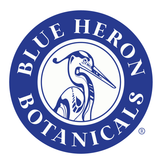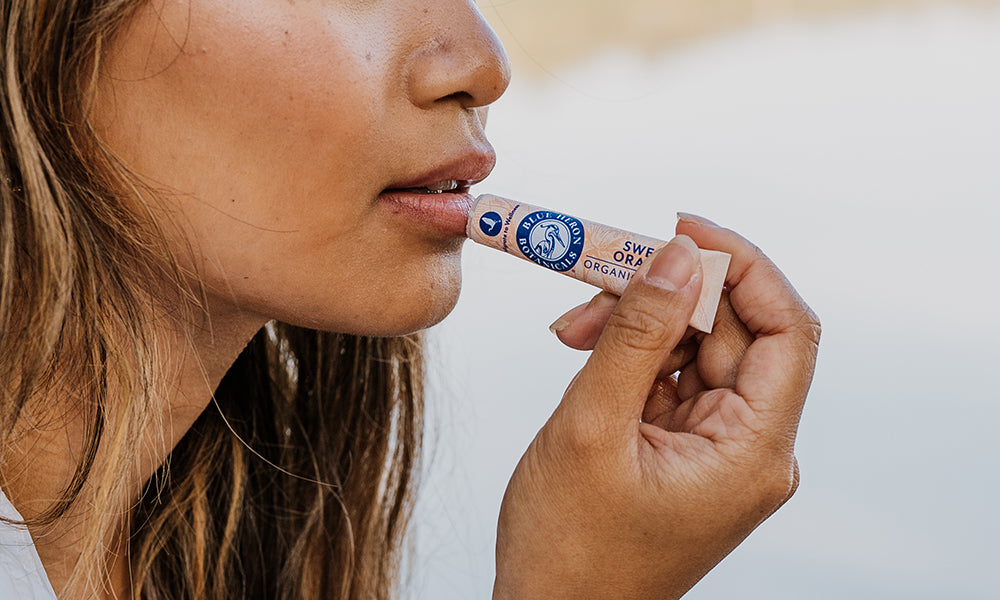If you're a rosacea-haver, you've likely had many a trip to the derm and have tried more than a few creams and medications to try to banish your unwelcome red friend. If you're over the pills, tired of the prescriptions and want to find an effective natural solution, you've come to the right place, friend!
In today's blog, we're chatting about natural rosacea remedies that address your skin from the inside out. Let's get to the root causes of your rosacea by looking at your diet, skincare, and lifestyle and get out of the never-ending flare-up cycle.
Keep reading for:
- What is rosacea?
- The types of rosacea
- Symptoms of rosacea
- Rosacea triggers
- How to treat rosacea naturally
- Your rosacea questions answered

What is rosacea?
Sometimes thought of as facial redness, rosacea is a long-term red flush that can also look purple or brown depending on your skin tone. Often it shows up as acne-esque breakouts or visible small blood vessels, and it can sometimes cause eye irritation and even skin thickening.
Rosacea is often mistaken for a rash, dermatitis, acne, and a whole host of other potential skin conditions that cause skin redness and other symptoms of rosacea.
Are you just a frequent flusher or do you have rosacea?
Flushing itself is a natural response - whether you're embarrassed, windblown, drank too much, are overheated, sunburnt, or just flustered, it happens to all of us. So what's the difference between an embarrassed or weather-weary red face vs rosacea redness? The main difference: regular flushing will clear up quickly, whereas rosacea lasts much longer.
The types of rosacea
-
Erythematotelangiectatic rosacea: rosy, flushed skin, red rash-like areas, and visible blood vessels.
-
Papulopustular rosacea: redness, facial swelling, and breakouts that resemble severe acne.
-
Phymatous rosacea: thickening skin with a bumpy texture.
-
Ocular rosacea: red, irritated, swollen eyes that can swell shut with severe rosacea.
Where does rosacea develop?
Most rosacea is found on the face, around the nose and cheeks, but it can spread to the rest of the face, ears, neck, back, and scalp in less common cases. Rosacea also affects the eyes in about half of all rosacea-havers.

Rosacea symptoms
-
Red, flushed, warm-feeling skin that lasts for days, weeks, or months. Redness is very apparent on fair skin, but those with darker skin tones may only notice the warm sensation.
-
Visible enlarged blood vessels - this is easier to see on lighter skin tones.
-
Swollen red bumps - these are often mistaken for acne.
-
Burning sensation - rosacea can cause your skin to be super sensitive and created a painful burning sensation when anything is applied to the face, including water.
-
Extreme dryness: extremely dry skin that feels rough, itchy, and tight.
-
Eye issues: swollen, dry, red, irritated eyes or eyelids.
-
Thickened skin: when rosacea persists, some people will notice thickening skin, often around the nose.
Rosacea triggers
Rosacea isn't fully understood yet but some its triggers for flare-ups are well-known:
-
Stress
-
Weather - too much sun, heat, cold, or wind
-
Alcohol, caffeine, and inflammatory foods
-
Physical stress from things like exercise or not enough sleep
How to treat rosacea symptoms naturally
While there are a whole host of creams, medications, and even laser treatment for rosacea, some people prefer to take the all-natural route and explore potential root causes that they can address themselves. Some of our top tips for addressing rosacea naturally:
Finesse your foods
Most of us think of skin concerns as only topical, but the truth is, internal issues often show up on our skin. The easiest place to start: your diet. Try removing inflammatory foods like alcohol, processed foods, caffeine, excessive sugar and/or salt, and anything you may be sensitive to. Add in more fruits, vegetables, and omega-rich foods and keep track of how your skin's doing. Food can often be our greatest natural healer.
You can also take things one step further and work with a natural health provider to pinpoint any food sensitivities and allergies.

Choose calm
Excessive stress shows up on our skin and if you have rosacea, you know that high-stress times will often trigger a flare-up. Try to integrate some stress-reducing practices like deep breathing, meditation, morning sun exposure (with sunscreen ofc), grounding with your feet in the grass, dancing, shaking and watch how your rosacea reacts.
And remember, stress can come in many forms - not getting enough sleep or overexertion for example, are also stressors to the body. When your body's not getting enough rest mentally or physically, it will let you know.
Protect your skin from the sun
As much as we love sunlight and the vitamin-D-fueled joy it brings, rosacea havers need to be extra conscientious about applying their SPF as those warming rays can irritate their skin and cause rosacea flare-ups.
Tip: opt for a mineral sunscreen - chemical sunscreens can be very irritating to rosacea-prone skin (not to mention the health concerns and coral reef damage connected to chemical sunscreens).
Choose natural skincare
Conventional skincare and makeup often contain a whole plethora of harsh (and unnecessary ingredients) that can irritate the skin and exacerbate rosacea. If you have rosacea, it's safe to say you have sensitive skin, and for us sensitive-skin-havers, your best bet is gentle, nourishing skincare products with natural ingredients.
Avoid any kind of artificial fragrance and stay away from alcohols, glycolic acids, lactic acid, and common acne-fighting ingredients like benzoyl peroxide and salicylic acid. Say no to scrubs, aggressive physical exfoliants, and all sulphates which can exacerbate and trigger symptoms of rosacea.
Once you've swapped out those irritating products, swap in products that will actually help! Choose skincare with anti-inflammatory, redness reducing, deeply soothing ingredients that will heal your rosacea.
Our Wound Warrior Balm is formulated with a powerful and highly effective blend of 100% natural botanicals and essential oils to calm inflammation, reduce redness, relieve pain, prevent scarring, and instantly soothe irritation caused by rosacea.
If you're not sure how your skincare is affecting your rosacea, go back to the basics with only essential products containing natural ingredients. Then, once your rosacea calms down, start adding extra products or treatments in one-by-one to see how they affect your skin. The key: only adjust one variable at a time!

Rosacea-reducing ingredients in our Wound Warrior Balm
Comfrey
One of nature's most effective skin healers, comfrey is packed with allantoin to boost new skin cell growth, rosmarinic acid to shield you from UV damage, and tannins to zap redness and inflammation.
Learn more about the incredible healing power of comfrey on our blog.
Lavender
Well-known for its effectiveness against rosacea, lavender eases inflammation, reduces redness, and comforts irritated skin.
Calendula
An ultra soothing, antioxidant-rich plant, calendula is packed with anti-inflammatory compounds like tumor necrosis factor alpha to reduce swelling, pain, and heal rosacea flare-ups faster.
Calendula also boosts collagen, speeding up skin regeneration, and offers a natural SPF of about 8 for extra sun protection.
Rosemary
Rich in an anti-inflammatory chemical called carnosol, rosemary essential oil calms redness, soothes irritation, and helps take down swelling or discomfort caused from chronic inflammation.
Tea tree
Studies have found links between microscopic skin mites and rosacea. Tea tree oil has been shown to effectively kill these mites at the same speed as conventional medical treatments.
Red thyme
Known for healing scars and preventing infection, antibacterial thyme helps reduce pain, take down inflammation, and calm redness.
German blue chamomile
The ultimate soothing plant, chamomile eases itchiness and pain and acts as a strong anti-inflammatory agent.
Beeswax
Beeswax is a triple threat for sensitive rosacea skin. It’s a potent anti-inflammatory agent, antibacterial, and rejuvenating antioxidant all in one.
Your rosacea questions answered
What causes rosacea to appear?
Scientists don't fully understood the cause of rosacea but some of their theories are: a hyperactive immune system, a weakened skin barrier, genetics, GI issues, a disregulated nervous system or vascular system, or microscopic demodex mites.
How do I heal my rosacea naturally?
Start by looking at your diet and removing inflammatory foods, removing any irritating ingredients from your makeup and skincare routine, eliminating alcohol and caffeine, reducing your stress levels, and always wearing SPF to protect your sensitive skin from the sun's rays.
How to heal rosacea from the gut?
There are links between rosacea and the gut microbiome, and while scientists are still studying the exact mechanisms, several experts have advised a fiber-rich prebiotic diet to help heal rosacea-related gut issues.
What is the main trigger for rosacea?
While it varies widely, the main triggers for rosacea are sunlight exposure, harsh chemicals from skincare, makeup, and hair products, alcohol and caffeine, spicy foods, and overexertion.
________________________
Have more questions about the healing power of plants? Send us a message anytime, we love chatting natural remedies.
- Team Blue Heron xo





